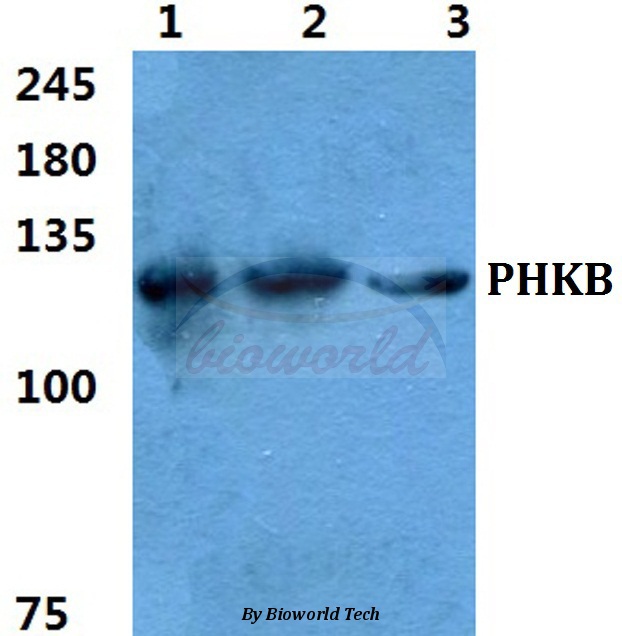Product Name :
PHKB polyclonal antibody Background :
Phosphorylase kinase is a hexadecameric enzyme that is comprised of four copies of four subunits that are encoded by four separate genes: PHKA, PHKB, PHKG, and PHKD. This serine/threonine specific kinase converts glycogen phosphorylase b to glycogen phosphorylase a, resulting in the release of glucose-1-phophate from glycogen. PHKB (Phosphorylase b kinase regulatory subunit beta) is a 1093 amino acid subunit of phosphorylase kinase that, along with PHKA, has regulatory functions controlled by phosphorylation. Defects in the gene encoding PHKB are the cause of glycogen storage disease type 9B, which is also known as phosphorylase kinase deficiency of liver and muscle. This disease is characterized by a mild phenotype of hepatomegaly with only slightly elevated transaminase and plasma lipids, no clinical muscle involvement, and generally is correlated with a gradual improvement with increasing age. There are four isoforms of PHKB that are produced as a result of alternative splicing events. Product :
Rabbit IgG, 1mg/ml in PBS with 0.02% sodium azide, 50% glycerol, pH7.2 Storage&Stability :
Store at 4°C short term. Aliquot and store at -20°C long term. Avoid freeze-thaw cycles. Specificity :
PHKB polyclonal antibody detects endogenous levels of PHKB protein. Immunogen :
Synthetic peptide, corresponding to amino acids 699-744 of Human PHKB. Conjugate :
Unconjugated Modification :
Unmodification
PHKB polyclonal antibody Background :
Phosphorylase kinase is a hexadecameric enzyme that is comprised of four copies of four subunits that are encoded by four separate genes: PHKA, PHKB, PHKG, and PHKD. This serine/threonine specific kinase converts glycogen phosphorylase b to glycogen phosphorylase a, resulting in the release of glucose-1-phophate from glycogen. PHKB (Phosphorylase b kinase regulatory subunit beta) is a 1093 amino acid subunit of phosphorylase kinase that, along with PHKA, has regulatory functions controlled by phosphorylation. Defects in the gene encoding PHKB are the cause of glycogen storage disease type 9B, which is also known as phosphorylase kinase deficiency of liver and muscle. This disease is characterized by a mild phenotype of hepatomegaly with only slightly elevated transaminase and plasma lipids, no clinical muscle involvement, and generally is correlated with a gradual improvement with increasing age. There are four isoforms of PHKB that are produced as a result of alternative splicing events. Product :
Rabbit IgG, 1mg/ml in PBS with 0.02% sodium azide, 50% glycerol, pH7.2 Storage&Stability :
Store at 4°C short term. Aliquot and store at -20°C long term. Avoid freeze-thaw cycles. Specificity :
PHKB polyclonal antibody detects endogenous levels of PHKB protein. Immunogen :
Synthetic peptide, corresponding to amino acids 699-744 of Human PHKB. Conjugate :
Unconjugated Modification :
Unmodification
-
 Western blot (WB) analysis of PHKB polyclonal antibody at 1:500 dilution Lane1:Hela cell lysate Lane2:sp2/0 cell lysate Lane3:H9C2 cell lysate
Western blot (WB) analysis of PHKB polyclonal antibody at 1:500 dilution Lane1:Hela cell lysate Lane2:sp2/0 cell lysate Lane3:H9C2 cell lysate
Bioworld Biotech only provide peptides for our antibodies and do not provide additional peptide customization services.
Price/Size :
USD 368/1mg/vial
Tips:
For phospho antibody, we provide phospho peptide(0.5mg) and non-phospho peptide(0.5mg).Describe :
Blocking peptides are peptides that bind specifically to the target antibody and block antibody binding. These peptide usually contains the epitope recognized by the antibody. Antibodies bound to the blocking peptide no longer bind to the epitope on the target protein. This mechanism is useful when non-specific binding is an issue, for example, in Western blotting (WB) and Immunohistochemistry (IHC). By comparing the staining from the blocked antibody versus the antibody alone, one can see which staining is specific; Specific binding will be absent from the western blot or IHC performed with the neutralized antibody.Formula:
Synthetic peptide was lyophilized with 100% acetonitrile and is supplied as a powder. Reconstitute with 0.1 ml DI water for a final concentration of 10 mg/ml.The purity is >90%,tested by HPLC and MS.
Storage:
The freeze-dried powder is more stable. For short time at 2-8°C. For long term storage store at -20°C.
Note :
This product is for research use only (RUO only). Not for use in diagnostic or therapeutic procedures.
 PHKB polyclonal antibody
PHKB polyclonal antibody  Datasheet
Datasheet COA
COA MSDS
MSDS SHIP
SHIP